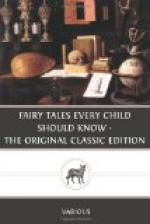And he hated his gold sovereigns, as they lay with a broad smile of self-satisfaction all over their yellow faces.
The queen was in the parlour, eating bread and honey. But at the second mouthful she burst out crying, and could not swallow it. The king heard her sobbing. Glad of anybody, but especially of his queen, to quarrel with, he clashed his gold sovereigns into his money-box, clapped his crown on his head, and rushed into the parlour.
“What is all this about?” exclaimed he. “What are you crying for, queen?”
“I can’t eat it,” said the queen, looking ruefully at the honey-pot.
“No wonder!” retorted the king. “You’ve just eaten your breakfast—two turkey eggs, and three anchovies.”
“Oh, that’s not it!” sobbed her Majesty. “It’s my child, my child!”
“Well, what’s the matter with your child? She’s neither up the chimney nor down the draw-well. Just hear her laughing.”
Yet the king could not help a sigh, which he tried to turn into a cough, saying:
“It is a good thing to be light-hearted, I am sure, whether she be ours or not.”
“It is a bad thing to be light-headed,” answered the queen, looking with prophetic soul far into the future.
“’T is a good thing to be light-handed,” said the king.
“’T is a bad thing to be light-fingered,” answered the queen.
“’T is a good thing to be light-footed,” said the king.
“’T is a bad thing—” began the queen; but the king interrupted her.
“In fact,” said he, with the tone of one who concludes an argument in which he has had only imaginary opponents, and in which, therefore, he has come off triumphant—“in fact, it is a good thing altogether to be light-bodied.”
“But it is a bad thing altogether to be light-minded,” retorted the queen, who was beginning to lose her temper.
This last answer quite discomfited his Majesty, who turned on his heel, and betook himself to his counting-house again. But he was not half-way towards it, when the voice of his queen overtook him.
“And it’s a bad thing to be light-haired,” screamed she, determined to have more last words, now that her spirit was roused.
The queen’s hair was black as night; and the king’s had been, and his daughter’s was, golden as morning. But it was not this reflection on his hair that arrested him; it was the double use of the word light. For the king hated all witticisms, and punning especially. And besides, he could not tell whether the queen meant light-haired or light-heired; for why might she not aspirate her vowels when she was exasperated herself?
He turned upon his other heel, and rejoined her. She looked angry still, because she knew that she was guilty, or, what was much the same, knew that he thought so.
“My dear queen,” said he, “duplicity of any sort is exceedingly objectionable between married people of any rank, not to say kings and queens; and the most objectionable form duplicity can assume is that of punning.”




